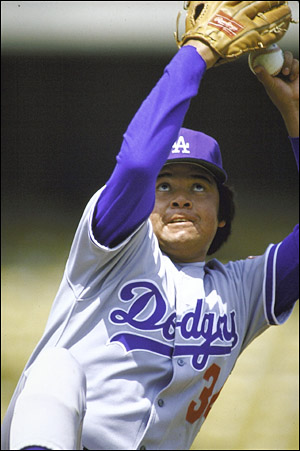| Sponsored Links | |
 Fernando Valenzuela:ESPN is 30 to 30 documentary series moves right along with Fernando Nation, “directed by Cruz Angeles, was born in Mexico and raised in South Central Los Angeles who now lives in Brooklyn, New York. Although it is not only a portrait of the rapid growth Fernando Valenzuela, the top in 1981, is perhaps the first document of the social conditions of Latin American community during this time.
Fernando Valenzuela:ESPN is 30 to 30 documentary series moves right along with Fernando Nation, “directed by Cruz Angeles, was born in Mexico and raised in South Central Los Angeles who now lives in Brooklyn, New York. Although it is not only a portrait of the rapid growth Fernando Valenzuela, the top in 1981, is perhaps the first document of the social conditions of Latin American community during this time.Angeles first discusses the plight of the residents of Chavez Ravine to the Dodgers moved to Los Angeles. “You can not talk about the Fernando-Mania, not to mention Chavez Ravine,” said Angeles. In an interview with Dolores Huerta, vice president emeritus United Farm Workers of America, J. Gerardo Lopez La opinions and other public figures, Angeles, delves into the painful Latin community in Los Angeles felt when thinking about the Dodgers and the Dodgers as a matter of fact only for white fans.
With Walter O’Malley knowing the potential money to be made of the Latin American community, he always wanted to find “Mexican Sandy Koufax.” Unfortunately, he would never see one in my life, but thanks to scout Mike Brito, they finally got one in Fernando Valenzuela.
And, unfortunately, at this point, where the documentary leaves tracks.
Yes, it’s great to get a taste of Valenzuela 8-0 start in 1981 thanks to a longtime fan Paul Haddad identifies the radio this year. But it was obvious that the 50-minute limit really a documentary of injustice.
All events prior to 1981 was very well laid out allows the viewer to easily digest the scene. But then the movie starts to go at breakneck speed, making it difficult for baseball fans simply enjoy the feat Valenzuela did. And then, perhaps the biggest, most egregious sin of all was done.
For the only non-Valenzuela in a bitter 29 June 1990, instead of using a big challenge Vin Scully moment (“Give you a sombrero in the air”) call ESPN out of the game was used.
Angeles did regret what he had to cut Bobby Castillo Valenzuela teaching psycho. Of course, it was an omission Valenzuela reluctance to step onto the Dodger Stadium until 2003, when he was persuaded to join the Dodgers Spanish-language broadcasting.
Despite its faults and shortcomings, “Fernando of the nation” continues to look strong for everyone.
Article Source:
http://www.12news.us/fernando-valenzuela.html

 Many MMA fans were writing off Diego Sanchez as he stepped into the cage against Paulo Thiago at UFC 121. It wasn't pretty in the first round as Thiago did much better work but Sanchez set such a hard pace that by the end of the round you could see Thiago fading.
Many MMA fans were writing off Diego Sanchez as he stepped into the cage against Paulo Thiago at UFC 121. It wasn't pretty in the first round as Thiago did much better work but Sanchez set such a hard pace that by the end of the round you could see Thiago fading. Victoria Rathgeb, former playmate charged with attempted murder, had TV career
Victoria Rathgeb, former playmate charged with attempted murder, had TV career WASHINGTON – If a person is associated with the mysterious death of Washington intern Chandra Levy, who is not the man who will soon be tried on charges that he murdered. He is a former California congressman Gary Condit, whose career imploded after he was linked romantically to the woman and became the No. 1 suspect.
WASHINGTON – If a person is associated with the mysterious death of Washington intern Chandra Levy, who is not the man who will soon be tried on charges that he murdered. He is a former California congressman Gary Condit, whose career imploded after he was linked romantically to the woman and became the No. 1 suspect. Stories of triumph over adversity are always an inspiration and for Terry Kennedy it just keeps getting better and better.
Stories of triumph over adversity are always an inspiration and for Terry Kennedy it just keeps getting better and better.








